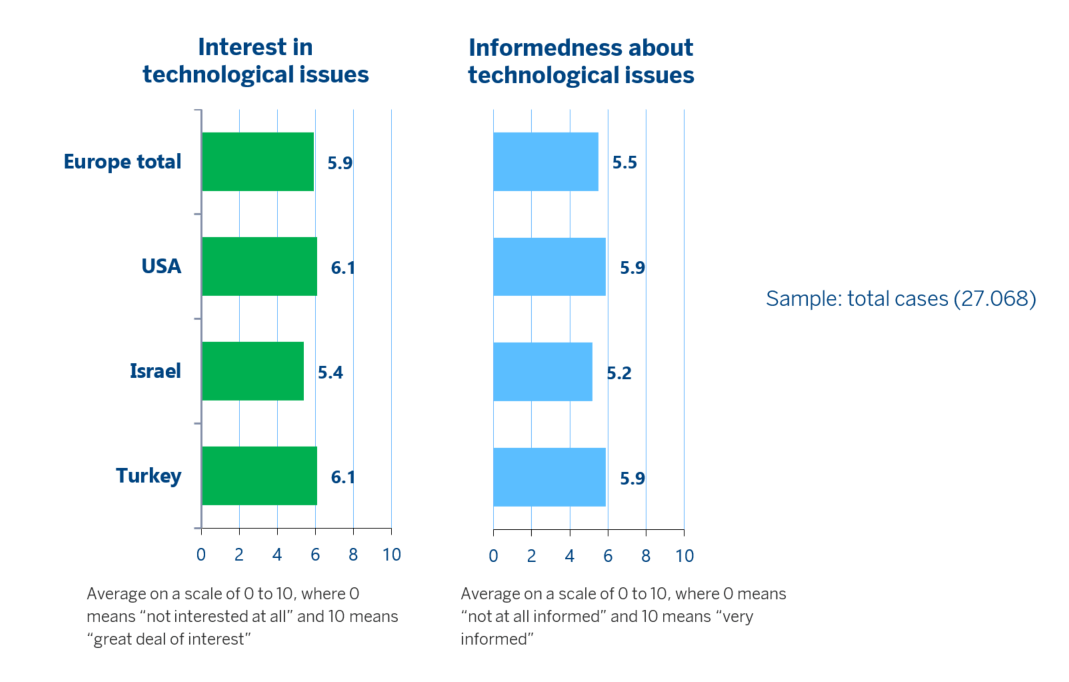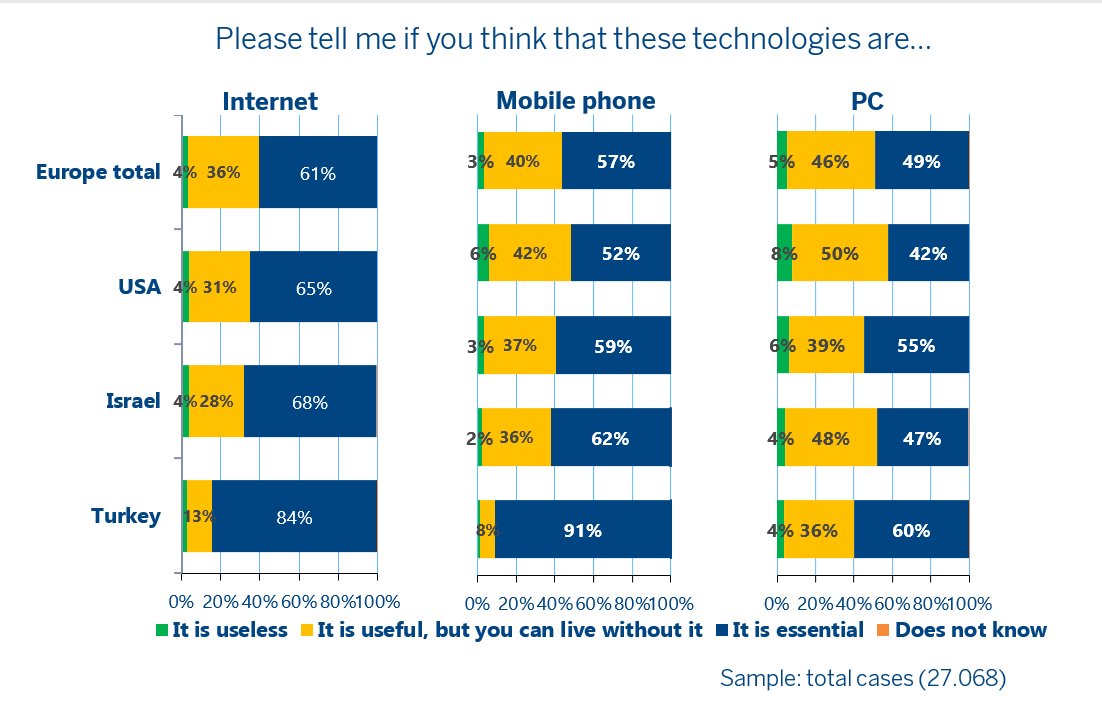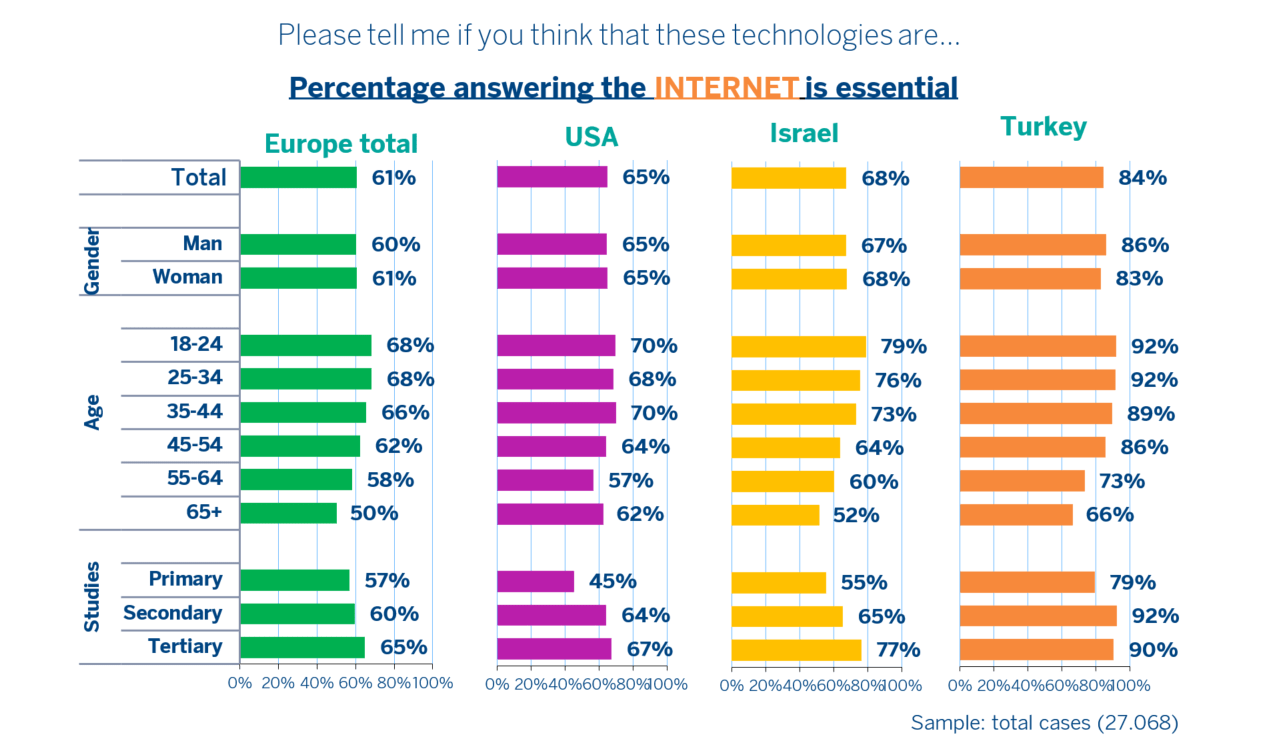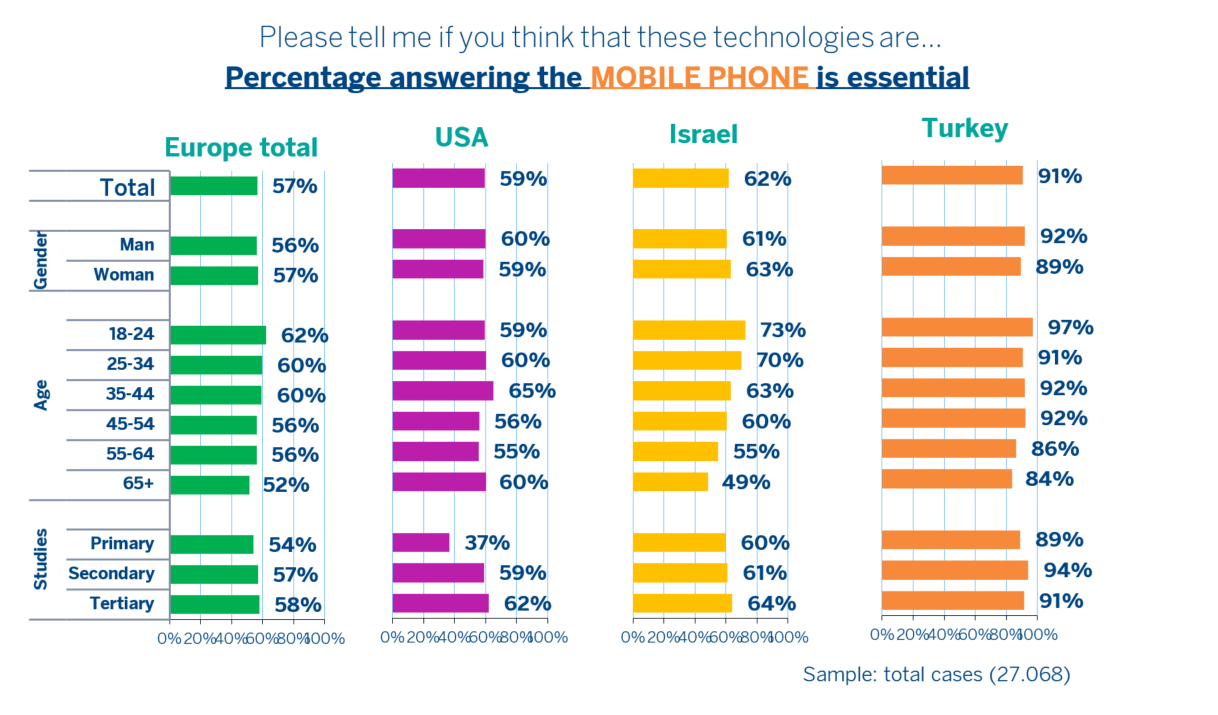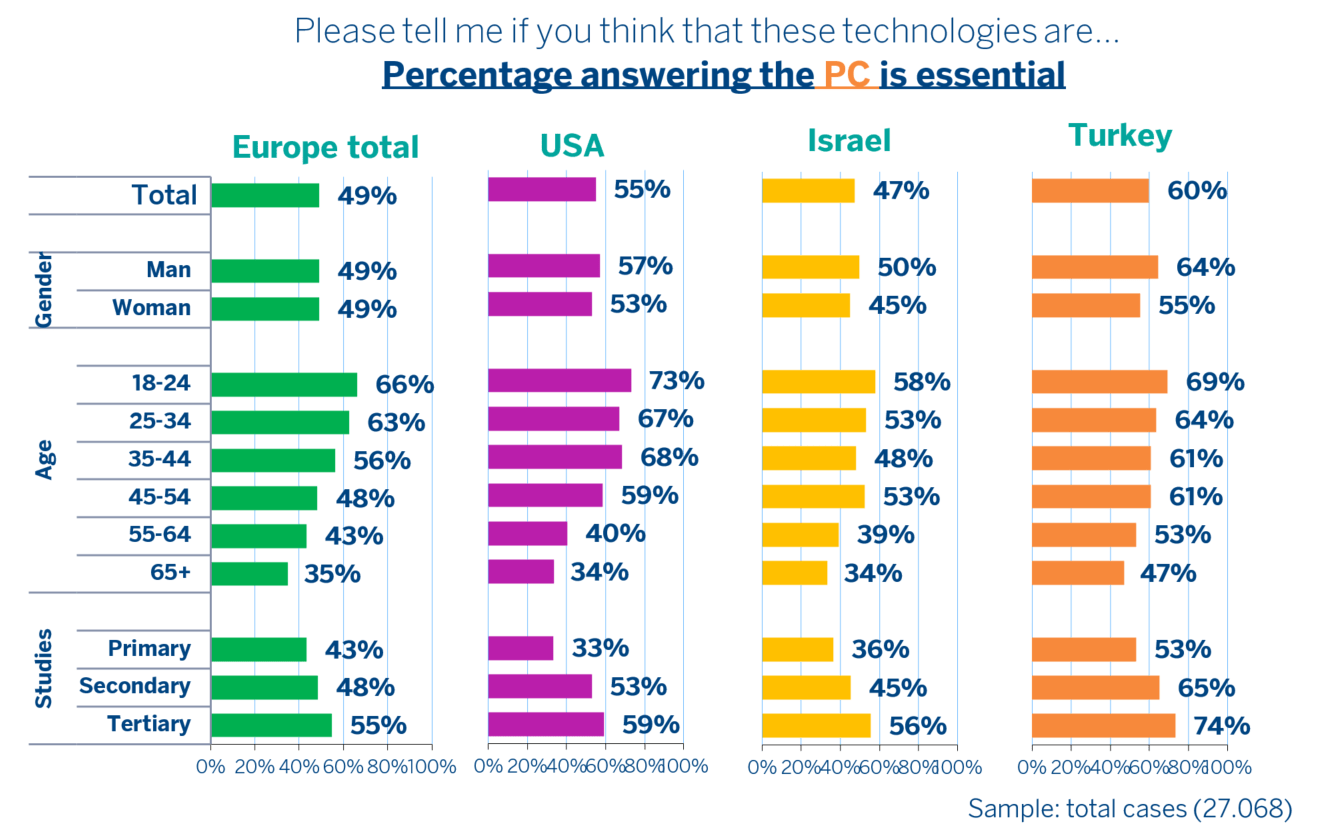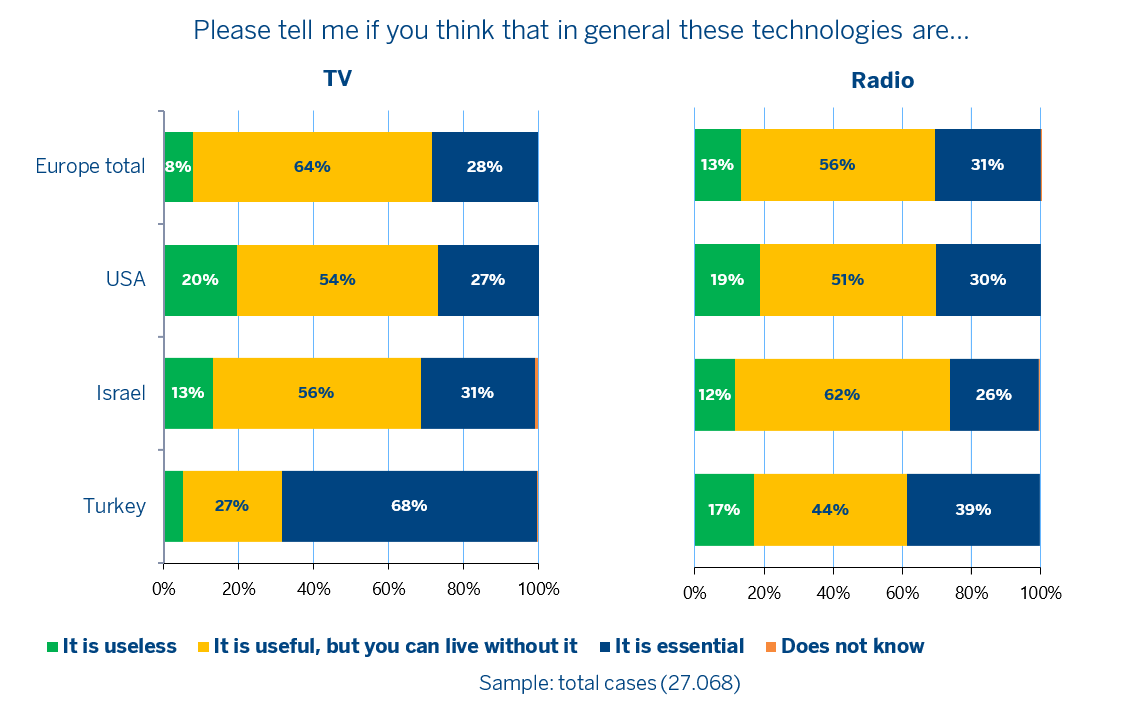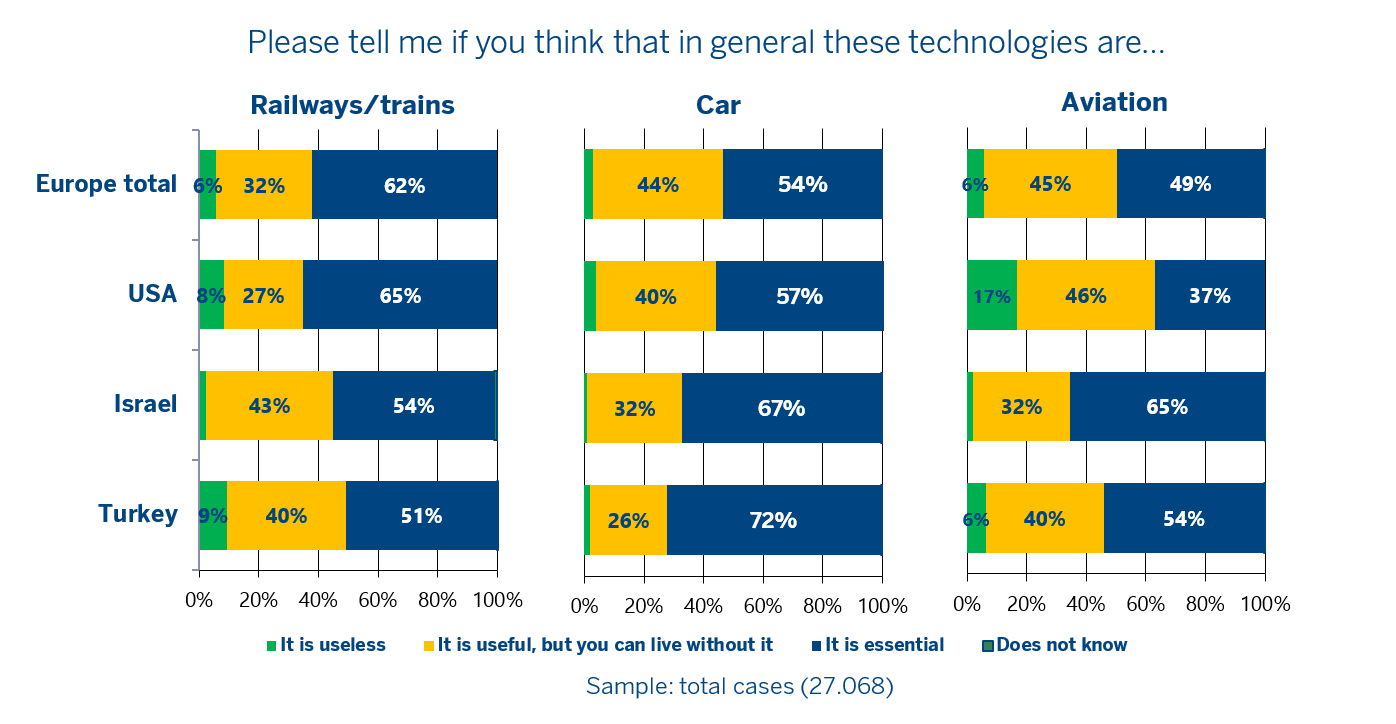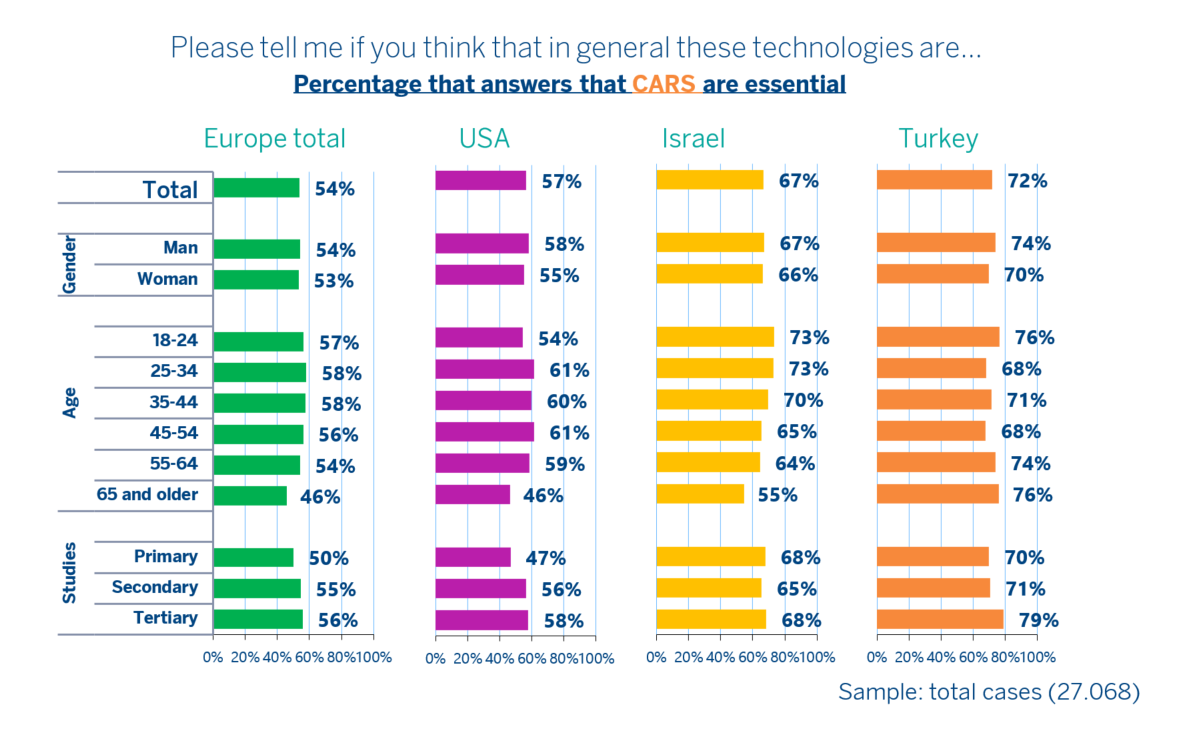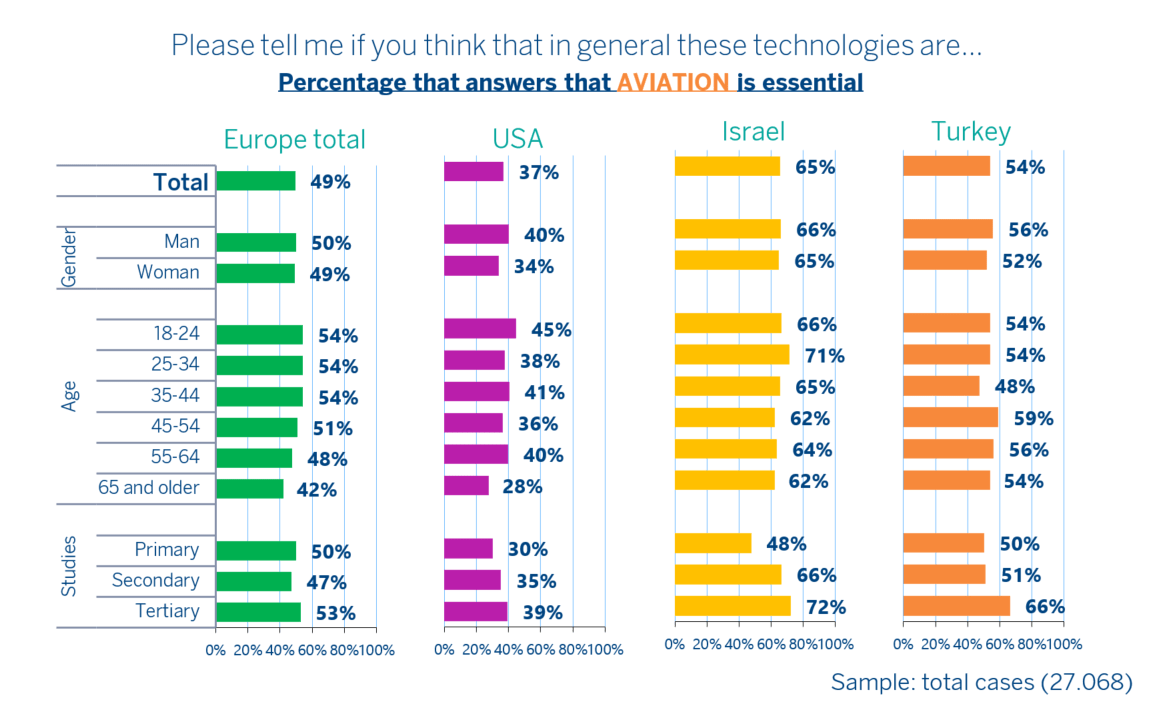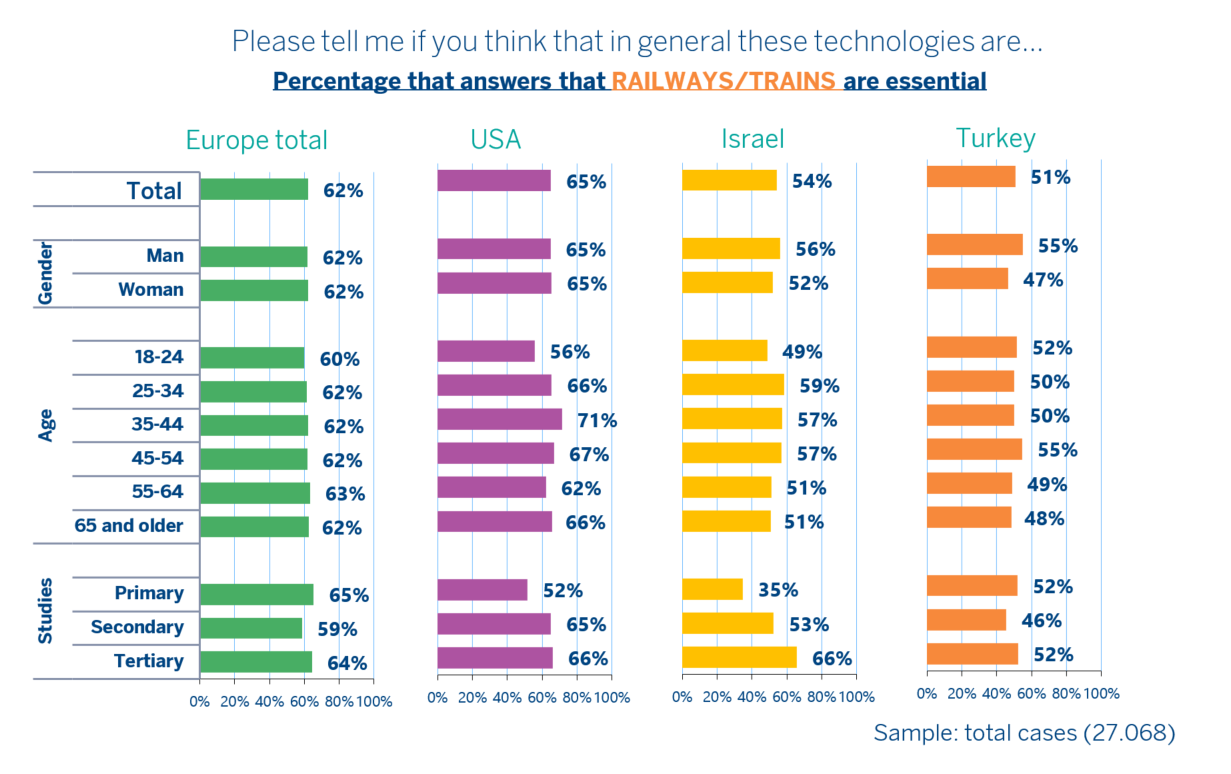
Internet and mobile phones have become “essential” technologies for a majority of citizens across all age groups in Europe, the United States, Turkey and Israel
The citizens of the developed world live in a techno-dependent society. From the time we get up to the time we go to bed we are constantly turning to the myriad devices and technologies that facilitate our lives at home, in the workplace and in our leisure space, as well as enabling our daily commute. The digital revolution has only increased this dependence on technology, now omnipresent and immediately accessible through the electronic devices in our pockets that allow us to communicate, shop, find our way around or monitor our health, as well as keeping us informed and entertained. In this context, what do citizens feel about the technologies around them and how have these feelings changed over time? Which do they consider most essential and which could they most easily do without? These are the questions posed in the third installment of the BBVA Foundation Study on Scientific Culture, a wide-ranging empirical study conducted in 15 European countries, including Denmark, France, Germany, Italy, the Netherlands, Portugal, Spain and the United Kingdom, and several countries of the former Eastern bloc – Bulgaria, the Czech Republic, Estonia, Hungary, Poland, Romania and Slovakia –, as well as three other societies with disparate profiles: Israel, Turkey and the United States.
18 October, 2024
The first installment of the study covered the attitudinal dimension, along with citizens’ overall perception of science-related values and the trust they place in science and the scientific community. Its main conclusion was that a clear majority in all the countries surveyed view science as the most reliable, objective and truthful source of knowledge and a motor of material progress, expressing widespread trust in its potential to address today’s major challenges. The second installment zoomed in on the cognitive dimension or level of scientific knowledge held by citizens. Among its findings was that a majority of Americans, Europeans, Turks and Israelis have an understanding of basic scientific concepts and the processes of validation of scientific knowledge, while still failing to exceed the midpoint on an elementary knowledge scale.
This third installment looks at another significant aspect of scientific-technological culture: how citizens perceive some of the main technologies present in daily life and the importance they attach to each.
At a time of disruptive political and socioeconomic transformations linked to the digital revolution, the citizens of all survey countries expressed strong overall support for technology, while distinguishing between the different examples around them and ranking them according to importance.
A large majority define the internet and mobile phones, the train and the car, as essential technologies, with opinion divided on aviation and personal computers. The predominant view is that traditional 20th-century technologies like TV and radio are useful but not essential, though note that the reference here is primarily to the receiver sets in our homes rather than television or radio content, which is increasingly consumed via the internet or mobile devices.
The study provides a map of the public’s perception of technologies at the present time and its evolution over the past fifteen years, which shows a growing generational convergence in terms of the usefulness of the main technologies, considered essential by citizens of all ages.
High levels of interest and informedness on technological issues
The level of declared interest in technological issues stands in the medium-high range across the 18 survey countries, with citizens in general saying that they feel reasonably well informed.
The highest levels of interest and informedness are reported in the United States and Turkey (6.1 and 5.9 respectively in both countries on a scale of 0 to 10) and the lowest of all in Israel, albeit still above the midpoint of the scale (5.4 and 5.2). The European average in these respects works out at 5.9 and 5.4 respectively.
The internet and mobile phones are rated essential technologies across all age groups
The internet, the product of a broad array of technological developments, has become an “essential” technological construct for over 60% of Europeans, Americans, Israelis and Turks. The majority of citizens in all societies (59% in the United States, 57% in Europe as a whole, 62% in Israel and as many as 91% in Turkey) feel the same about the mobile phone. This view on the importance of the internet and mobile phone holds true for all age groups, including those aged 65 and over.
Unlike the internet and mobiles, the personal computer meets with a division of opinions between those who see it as essential and those who feel that it is useful, but dispensable.
The Turks stand apart in their more emphatic belief in the essential nature of these information and communication technologies.
Young people are likelier to see personal computers and the internet as essential technologies, whereas age barely influences perceptions of the mobile phone
Age is at times a differentiating factor in perceptions of information and communication technologies, especially in the case of the personal computer and, less markedly, the internet and mobile phones.
Sixty-six percent of young people in Europe as a whole and 73% of Americans consider the personal computer essential, compared with far lower percentages (35% and 34% respectively) among citizens aged 65 and over.
Age is also an influence, albeit rather less so, in the case of the internet, with 68% and 70% of young Europeans and Americans respectively rating it essential, compared to 50% and 62% among older age groups. With regard to the mobile phone, the differences are smaller: 62% of young people in Europe and 59% in the United States consider it essential, compared with 52% and 60% respectively in the 65-and-older age group.
The percentage seeing the personal computer and internet as essential also increases among those of a higher educational level, while, again, the mobile tends to be viewed more homogeneously across the majority of countries surveyed.
Only age in Israel and educational level in the United States determine greater differences versus Europe in perceptions of the mobile phone.
The gender variable barely influences responses to technologies, with the sole exception of the personal computer, which more men than women view as essential.
TV and radio sets are seen as useful but not essential
At a time when TV and radio contents can be accessed via digital media and not just radio and television receivers, a large majority of citizens see TV and radio technologies (sets) as useful but dispensable.
Across Europe, 28% view TV as essential, rising to 31% for radio. The channel itself has in this sense waned in importance compared to radio and TV programs and content available through other means.
Although only a minority of citizens overall describe TV and radio technologies as useless, this view gains more traction in the United States. The Turks, conversely, remain convinced of their importance, with a majority rating TV an essential technology.
The train, the most essential means of transport
Transport technologies are perceived as essential by the majority, with the most accessible and least polluting means of transport – the train – in first place, followed by the car and the plane.
Citizens in the United States and Europe attach most importance to the train. By contrast, the Turks give pride of place to the car and the Israelis to aviation.
The car and aviation are considered more essential among young people and those of a higher educational level
While the train is rated essential in similar measure across different age groups, and rather less evenly by years of study, differences become more marked in the case of the car and, especially, aviation, which tend to be seen as less essential by older adults and those of a lower educational level.
Technical notes
- Geographical scope of the study: Bulgaria, Czech Republic, Denmark, Estonia, France, Germany, Hungary, Italy, Netherlands, Poland, Portugal, Romania, Slovakia, Spain, United Kingdom, United States, Israel and Turkey.
- Universe: in each country, the general population aged 18 and over.
- Method: computer-assisted telephone survey and, in Turkey and Israel, personal survey.
- Sample size and distribution: 1,500 cases per country. Multistage sample distribution stratified by region (NUTS classification or equivalent)/size of habitat, with primary units selected at random at municipality level and selection of individuals according to sex and age quotas.
- Sampling error: the estimated sampling error is +/- 2.6% for each country for a 95% confidence level and in the worst case scenario (p=q=0.5).
- Fieldwork was carried out between April and July, 2023.
- Weighting: for the results of the European countries surveyed, the data for each country have been weighted according to the population weight of each in the universe of European countries included.
- The fieldwork was coordinated and conducted by KANTAR PUBLIC (currently Verian) with registered address in Madrid, Calle Poeta Maragall, 23. 28020.
- The design of the questionnaire and data analysis were the work of the BBVA Foundation Department of Social and Public Opinion Studies.


